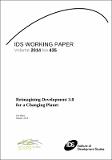Reimagining Development 3.0 for a Changing Planet
Abstract
This working paper argues we need to reimagine development tactics to fashion Development 3.0, to match what business analysts now call World 3.0, a global system characterized by high turbulence and new threats. It begins by contrasting our former classification of countries spatially into First, Second and Third worlds with a new division of development epochs in sequence since the end of World War II. World 1.0 emphasized industrialization, urbanization, and modernization, lasting from 1945 to 1980. World 2.0 emphasized global trade, and a shift to private actors doing the work of development, from 1980 to the early 2000s. World 3.0 can be seen as superceding globalization by concern with emergent threats. World 1.0 privileged state actions to accelerate “nation building” within former colonies, whereas World 2.0 privileged private capital and free trade as engines for economic growth. Now, following wars, disasters, and the near meltdown of the global financial system in 2007/08, we enter World 3.0 as depicted by Ghemawat and others.
We review thirteen major changes not recognized within World 2.0 or its accompanying Development 2.0 regime. The major changes include the rise of homeless capital, the Conservative counter-revolution of the 1980s, the implosion of the USSR, rise of modern China, emergence of BRIC nations, a pan-urban world, rise of identity politics, reemergence of Africa, shift to non-state warfare, growing threat of climate change, MENA nations experience Arab Spring, digital worlds expand, and velocity increases. They suggest coming turbulence and unexpected outcomes, or “mashups” (Ramo).
These changes suggest a different emergent system, becoming World 3.0 which has profound differences from how we view our planet’s political economy (World 2.0).
If so, the paper outlines implications which suggest the time has come to “take on board” our changed planetary circumstances, and thus begin crafting Development 3.0.
“Where the wild things are”, introduces metaphors to change the ‘meta-narratives’ used for viewing World 3.0: “herding elephants,” “taming feral capital”, “swimming with tides” and “avoiding mashups”. They help us realize that long recognized problems (or “elephants”) may show unexpected behaviors to pose new threats within World 3.0.
The main argument of the paper then lays out a baker’s dozen changes needed if we hope to fashion more effective ways to promote development for us all. We must “rebalance society” (ala Mintzberg), refashion aid, privilege sustainability, emphasize fair trade, tame feral capital, devise better metrics, include all nations & peoples, seat G-20 not G-8, recognize semi-sovereigns, focus on a pan-urban world, build coalitions in networks, involve women & youth, and rebuild community leadership. All of which assumes we can offset a strong tide towards return to the excesses of World 2.0.
Is part of series
IDS Working Paper;435Rights holder
Institute of Development StudiesCollections
- IDS Research [1671]

